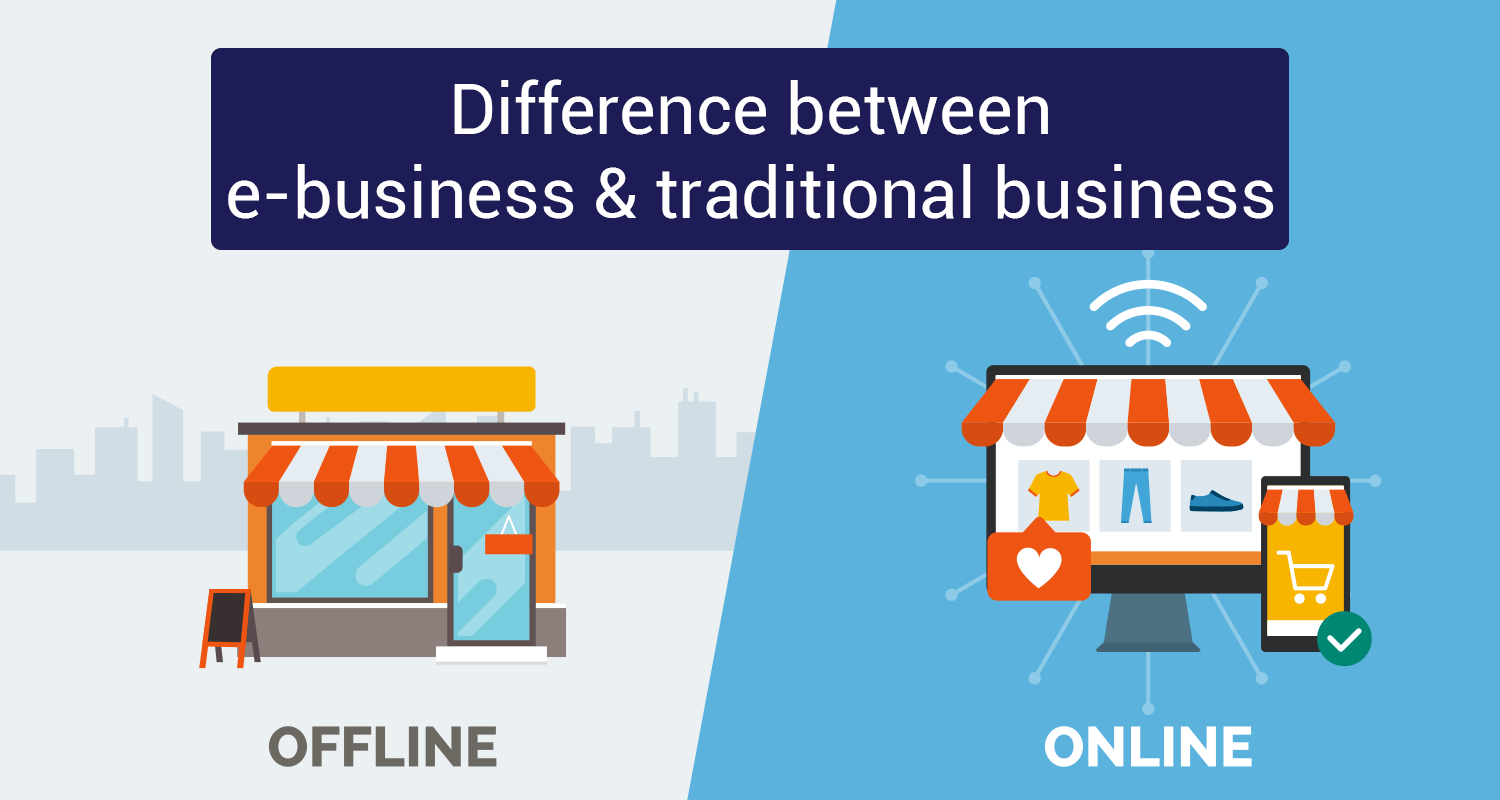Difference Between e-Business & Traditional Business

There has been a paradigm shift in the shopper in me from a conventional storefront to ordering a product from halfway around the world online with just a few clicks. E-business and traditional business are the two ways of conducting business with a unique character of their own. While the rise of e-business has created a fascinating dichotomy with traditional practices, some of us still prefer a personal touch, especially when buying for a large occasion. Let us find out what’s behind this evolving clash between the models and understand what each model can teach us about the future of commerce.
What is e-business?
Business activities conducted over the Internet or any other computer network are called e-business or electronic business. It includes business activities like trade, commerce, and industry conducted electronically. E-business is all about using the internet and other computer networks and technologies that provide superior customer service, increase sales, and reduce costs significantly. To conduct e-business, computer networks that are more secure, effective, and efficient are often used.
What is traditional business?
Traditional businesses have been the foundation of numerous industries and is usually a typical brick and mortar establishment with a strong supply chain and age-old customer relationships. In a traditional business, the offers of products or services are led through a local shop, store etc. to the local customers. One needs to visit the store physically for the touch and feel experience. A traditional business model involves huge costs for infrastructure and hiring of staff for smooth operations. Other important components include a hierarchy of command, clear roles and responsibilities, and predefined processes. Traditional businesses offer stability and a proven track record.
Sapna aapka. Business Loan Humara.
Apply NowWhat is the difference between e-business and traditional business?
| Basis | e-business | Traditional Business |
| Meaning |
Conducting business activities over the internet or any other computer network is known as e-business or Electronic Business. |
A Traditional business involves business conducted in a local store, shop, etc., which offers its services or products to its local customers. It is a place where customers will have to visit the store physically to buy the products or services. |
| Ease of Formation |
Formation of e-business involves a few easy steps |
Formation of traditional business is comparatively difficult and involves a long procedure |
| Physical Presence |
Physical presence is not required |
Physical presence is required |
| Locational Requirements |
Location is not required |
Location near raw materials and markets is required |
| Cost of Setting up |
Cost of setting up an e-business is low since there is no requirement for physical facilities |
Cost of setting up a traditional business is high as there is a requirement for physical facilities |
| Operating Cost |
Operating cost is minimal |
Operating cost is high because of fixed charges associated with storage, marketing, etc. |
| Contact with Suppliers and Customers |
Establishes direct contact with suppliers and customers |
There is indirect contact with suppliers and customers via intermediaries |
| Nature of Internal Communication |
Communication can flow in any direction |
Communication flows in hierarchical order |
| Response time for meeting Customers/ Internal Requirements |
It usually gives an instant response |
Response takes a longer time |
| Organisational Structure |
Organisational structure is vertical or tall due to the chain of command |
Organisational structure is horizontal or flat due to direct command and communication |
| Ease of going Global |
There are many chances of going global |
There are less chances of going global |
| Business Processes and Length of the Cycle |
There are short business processes and cycle |
There are long business processes and cycle due to several sequential processes |
| Opportunity Interpersonal Touch |
There is less opportunity for interpersonal touch |
There is more opportunity for interpersonal touch |
| Opportunity for physical pre-sampling of the Products |
There are less opportunities for physical pre-sampling of the products. It is mostly available in the case of books, software, journals, etc. |
There are many opportunities for physical pre-sampling of the products |
| Government Patronage |
Government patronage is increasing |
Government patronage is declining or shrinking |
| Nature of Human Capital |
Technically and professionally qualified human capital is needed |
Mostly semi-skilled and unskilled manpower is needed |
| Transaction Risk |
There are high transaction risks due to a lack of personal contact between the parties |
There are low transaction risks due to personal contact between the parties |
e-Business vs Traditional Business
If you are planning a business you may debate on whether to launch a traditional business or an e-business as both have unique offers and challenges. Thriving on technology providing global reach 24/7 and low operation cost could be the model for a business venture but you may also want the advantage of a traditional excellence for your business with robust personal relationships and a dazzling physical presence fostering trust and loyalty. Ultimately the determinant is the nature of the product or service and the objective of your business.
One would like the best of both worlds – leveraging the technological edge of e-business while preserving the personal touch of traditional business. The choice is yours.
Read More: Types of E-business Risks
FAQs
Q1. Is e-business more profitable than traditional business?Ans. The cost of setting up an e-business is low as there is no requirement for physical facilities. The cost of setting up a traditional business is high as there is a requirement for physical facilities.
Q2. What is the impact of e-business on the traditional business?Ans. E-commerce can impact traditional businesses by:
- dropping people's interest in shopping at traditional markets
- increasing people's consumptive behavior
- increasing market access for traditional businesses
- increasing the ability of traditional businesses to adapt to technology
Ans. An e-commerce website needs a low investment as compared to a physical store. Hence, these reduced costs could be passed on to customers at discounted prices. You cut down the prices for your e-commerce website by using of best marketing strategies like organic search, social media traffic, or social media traffic
Q4. What is traditional business strategy?Ans. A Traditional Business Model is a system referring to how a company operates and conducts business activities with its customers. It includes the design of value creation, delivery, and revenue generation mechanisms within an organisation.
Sapna aapka. Business Loan Humara.
Apply NowDisclaimer: The information contained in this post is for general information purposes only. IIFL Finance Limited (including its associates and affiliates) ("the Company") assumes no liability or responsibility for any errors or omissions in the contents of this post and under no circumstances shall the Company be liable for any damage, loss, injury or disappointment etc. suffered by any reader. All information in this post is provided "as is", with no guarantee of completeness, accuracy, timeliness or of the results etc. obtained from the use of this information, and without warranty of any kind, express or implied, including, but not limited to warranties of performance, merchantability and fitness for a particular purpose. Given the changing nature of laws, rules and regulations, there may be delays, omissions or inaccuracies in the information contained in this post. The information on this post is provided with the understanding that the Company is not herein engaged in rendering legal, accounting, tax, or other professional advice and services. As such, it should not be used as a substitute for consultation with professional accounting, tax, legal or other competent advisers. This post may contain views and opinions which are those of the authors and do not necessarily reflect the official policy or position of any other agency or organization. This post may also contain links to external websites that are not provided or maintained by or in any way affiliated with the Company and the Company does not guarantee the accuracy, relevance, timeliness, or completeness of any information on these external websites. Any/ all (Gold/ Personal/ Business) loan product specifications and information that maybe stated in this post are subject to change from time to time, readers are advised to reach out to the Company for current specifications of the said (Gold/ Personal/ Business) loan.



